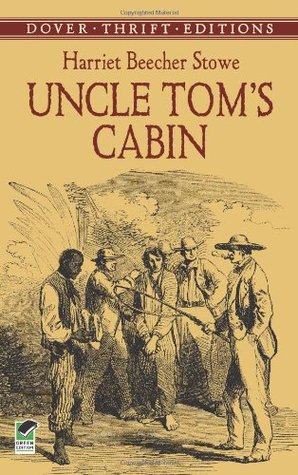Book 1
Synopsis per Goodreads:
Selling more than 300,000 copies the first year it was published, Stowe's powerful abolitionist novel fueled the fire of the human rights debate in 1852. Denouncing the institution of slavery in dramatic terms, the incendiary novel quickly draws the reader into the world of slaves and their masters.
Stowe's characters are powerfully and humanly realized in Uncle Tom, a majestic and heroic slave whose faith and dignity are never corrupted; Eliza and her husband, George, who elude slave catchers and eventually flee a country that condones slavery; Simon Legree, a brutal plantation owner; Little Eva, who suffers emotionally and physically from the suffering of slaves; and fun-loving Topsy, Eva's slave playmate.
Critics, scholars, and students are today revisiting this monumental work with a new objectivity, focusing on Stowe's compelling portrayal of women and the novel's theological underpinnings.
Stowe's characters are powerfully and humanly realized in Uncle Tom, a majestic and heroic slave whose faith and dignity are never corrupted; Eliza and her husband, George, who elude slave catchers and eventually flee a country that condones slavery; Simon Legree, a brutal plantation owner; Little Eva, who suffers emotionally and physically from the suffering of slaves; and fun-loving Topsy, Eva's slave playmate.
Critics, scholars, and students are today revisiting this monumental work with a new objectivity, focusing on Stowe's compelling portrayal of women and the novel's theological underpinnings.
Why is this book banned?
Harriet Beecher Stowe, an American author and abolitionist, wrote Uncle Tom's Cabin to depict the heartbreaking realities of slavery. The book was an instant bestseller and sparked heated debates over slavery in the United States. According to some accounts, this contributed to the divide between the North and South that led to the Civil War. When meeting Stowe, Abraham Lincoln supposedly remarked, "So you're the little woman who wrote the book that made this great war."
Banned in some parts of the South, Stowe's book provoked a variety of responses from supporters and detractors. Other books were published to counter her descriptions of slave life, such as Life at the South, or, Uncle Tom's Cabin as It Is. In the twentieth century, the novel has been challenged and banned in a number of libraries and schools because of its stereotypical depictions of African Americans and use of language now considered racist.
Why I disagree with its banning:
It was banned years ago when slavery was an issue, and a controversial matter. It's not the case now. It's still being challenged and banned because of the "N" word, and stereotyping. I think that's a load of bullhonkey. This book is part of a history that, in this day and age we find it hard to fathom what was going on through our ancestors minds. A historical book that was written in the times of slavery, in order to create the atmosphere of racism and ownership, you simply HAVE to have the "N" word. To have an accurate account of the past, you have to have words that were used in the past. I personally abhor the N word, but I realize that while reading and listening to this book I am going to see it and hear it because that is simply how it was back then. I think this book should continue getting read, if only for the fact to keep people grounded and remember that people can't be owned, it's an abomination. Slavery and everything it stood for, and I believe that Harriet set out to accomplish opening the eyes of the people around her, splitting up slaves and their families, while boasting that you are a Christian? She accomplished that, and this book has gone down in history as one of the reasons the Civil War and emancipation even came about. Don't smother history and hide it because of a few accurate words and descriptions of the things that occurred in the past.
The book itself is a hard read, emotional wise. I can't even imagine being a slave, or being sold or having my son being sold. It's hard. Some of the writing was a bit awful but I believe it was popular writing style for the time it was written, and it's one of my top favorite banned books, I've read it several times, and each time, it gets better.
Up Next..
The Glass Castle by Jeanette Walls



Glad you got your Banned Book read and reviewed. I will be at least a week late with mine. I haven't read this title in years - definitely a classic. I liked your review.
ReplyDelete